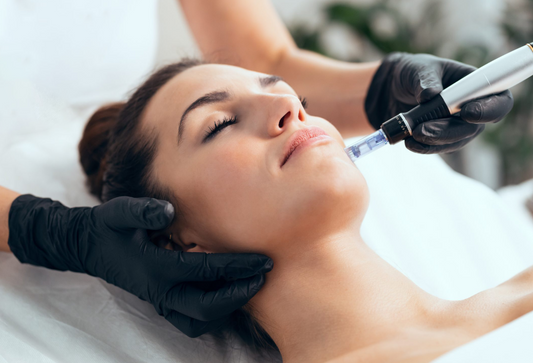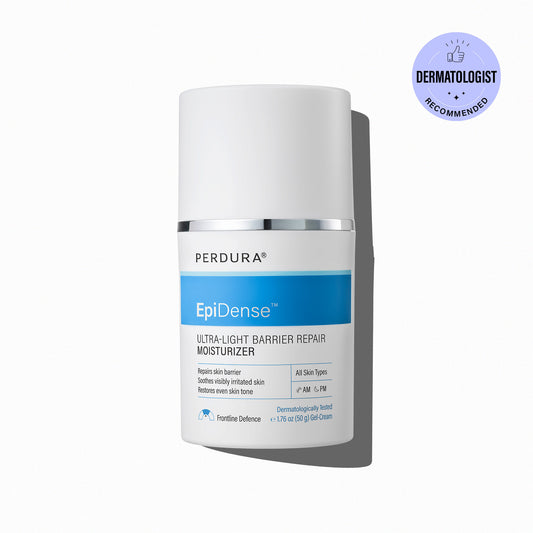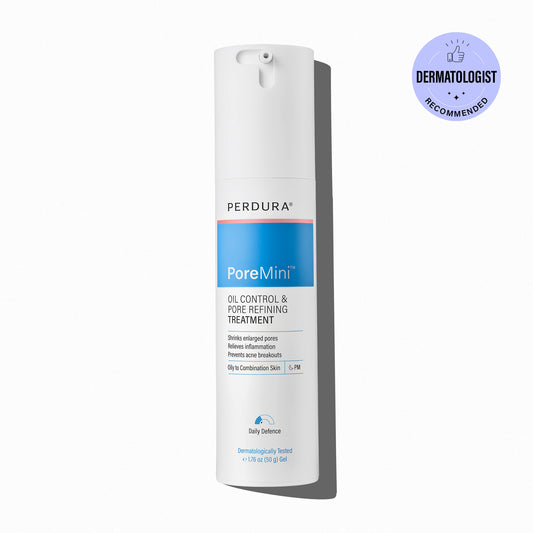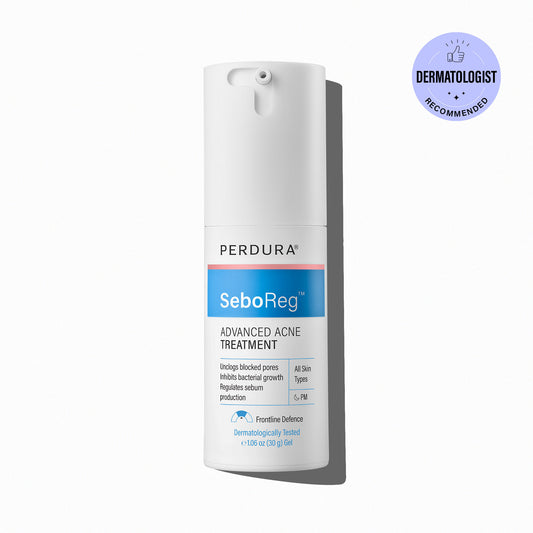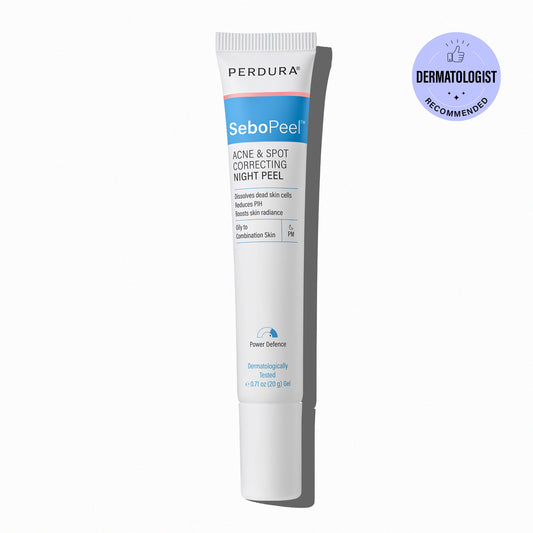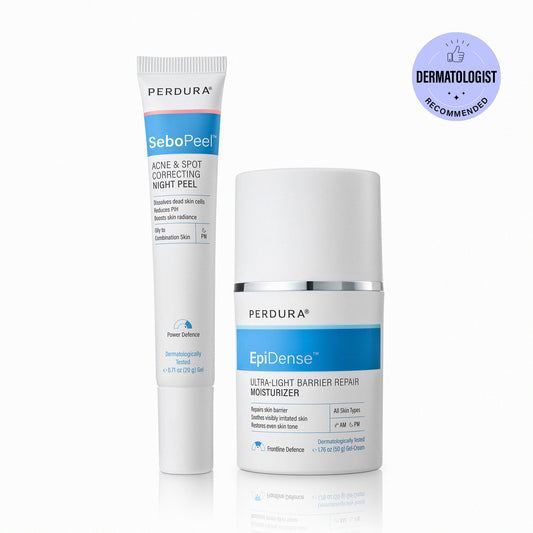Introduction
If there’s one thing you can count on in your teens - it’s acne! 85% of adolescents experience breakouts, and 20% develop facial scarring that can be severe and permanent. Acne doesn't just affect the skin; it can also lead to psychological distress, lower self-esteem, anxiety, and even depression.
Why are teenagers so susceptible to acne? We will explore the factors contributing to this and look for practical and effective strategies to manage the condition during those awkward years.
Understanding Teenage Acne
Acne occurs when hair follicles become clogged with oil and dead skin cells. This can lead to various types of blemishes on the skin.
- Whiteheads: Closed clogged pores that appear as small, white bumps on the skin.
- Blackheads: Open clogged pores that turn black due to oxidation.
- Pimples: Red, inflamed bumps that can be filled with pus.
- Cysts: Deep, painful lumps beneath the skin's surface can lead to scarring.
Read our in-depth blog, Understanding the Acne Lifecycle, for a more detailed understanding of the acne lifecycle, including when acne formation can start, how long it can last, and various scenarios for its duration.
Causes of Teenage Acne
1. Hormonal Changes
During puberty, the body produces more androgens, male hormones that play a key role in stimulating the sebaceous (oil) glands. This increase in androgens causes the glands to produce more sebum, an oily substance that can clog pores and lead to acne. This excess oil can mix with dead skin cells, creating a perfect environment for acne-causing bacteria to thrive.
Find out how to deal with hormonal acne in our detailed blog: Hormonal Havoc: Unveiling the Truth About Hormonal Acne.
2. Genetic Factors
Genetics can play a significant role in determining who gets acne. If your parents had acne, there's a higher likelihood that you will, too. This predisposition can affect how your skin responds to hormones and other acne triggers.
3. Diet and Nutrition
What you eat can have a significant impact on your skin. Certain foods can trigger or exacerbate acne.
Common Dietary Triggers
- High-Glycemic Foods: Foods that cause a rapid spike in blood sugar levels, such as sugary snacks and refined carbohydrates, can increase insulin levels and stimulate oil production.
- Dairy: Some studies suggest that dairy products, especially skim milk, can contribute to acne due to the presence of hormones and bioactive molecules.
4. Skincare and Hygiene Practices
A consistent skincare routine is crucial for managing acne. This includes cleansing, exfoliating, moisturizing, and using appropriate acne treatments.
Common Skincare Mistakes That Can Worsen Acne
- Over-cleansing or using harsh scrubs that irritate the skin.
- Not moisturising because you think that it will make the skin oilier.
- Using products that clog pores or are not suited for acne-prone skin.
5. Lifestyle Factors
Stress can exacerbate acne by increasing the production of cortisol, a hormone that can trigger more oil production and inflammation. Not getting enough sleep can lead to hormonal imbalances and increased stress levels, both of which can worsen acne.
To learn more about surprising acne triggers and how to avoid them, check out our detailed blog: 5 Surprising Acne Triggers and How to Avoid Them.
Effective Acne Management Strategies
1. Build a Solid Skincare Routine
Creating a consistent skincare routine is essential for managing acne. Start with the basics:
- Cleanse your face twice daily with a gentle, non-comedogenic cleanser to remove excess oil, dirt, and makeup.
- As tempting as it might be to pop that pimple- resist the urge! It spreads the bacteria to other parts of the face and damages the skin barrier, making it more likely to scar.

- Exfoliate regularly to slough off dead skin cells that can clog pores, but avoid over-exfoliating, which can irritate the skin.
Revitalize your skin overnight with SeboPeel Exfoliating Gel. Perfect for oily to combination skin, it corrects acne spots and improves skin tone.
- Moisturizing is also crucial to maintain the skin's barrier and prevent it from producing excess oil, even for oily skin types. Look for "oil-free" or "non-comedogenic" products to avoid clogging pores.
Looking for a moisturizer that repairs and soothes? Try EpiDense Moisturizer for visibly healthier and balanced skin.
Recommended Products for Teenage Skin: Choose products that are gentle yet effective, such as a mild cleanser, an exfoliant containing salicylic acid, and a light, oil-free moisturiser. Consider adding a spot treatment with benzoyl peroxide to target breakouts directly.
Take control of your acne with SeboReg Acne Control Gel. It unclogs blocked pores, inhibits bacterial growth, and regulates sebum production for comprehensive acne management.
2. Over-the-Counter Treatments
OTC acne treatments are widely accessible and can be very effective. Common ingredients include benzoyl peroxide, which kills acne-causing bacteria and reduces inflammation, and salicylic acid, which helps exfoliate the skin and keep pores clear. To use these treatments effectively, apply them as directed, typically once or twice a day.
Struggling with enlarged pores and oily skin? Try PoreMini Oil Control Gel to minimize pores, alleviate inflammation, and prevent acne breakouts. Shop now and achieve smoother, clearer skin!
Start with a lower concentration to see how your skin reacts, and always follow up with a moisturizer to prevent dryness.
For a deeper dive into how to choose between OTC and prescription treatments, read our blog: Understanding Prescription vs. OTC Acne Treatments.
3. Prescription Treatments
If OTC treatments aren't enough, it might be time to see a dermatologist. Prescription treatments include topical retinoids, which help unclog pores and prevent new breakouts, and antibiotics, which reduce bacteria and inflammation. Oral medications like isotretinoin are reserved for severe cases and are highly effective, but they come with potential side effects that need to be managed under medical supervision.
Conclusion: Setting Realistic Expectations
Acne treatment takes time, often several weeks to months, to show significant improvement. It’s essential to remain consistent with your skincare routine and treatments. Don't expect overnight results; patience and persistence are key. Remember that everyone has skin imperfections and that acne doesn't define you.
Key Takeaways
- Acne occurs when hair follicles become clogged with oil and dead skin cells, leading to whiteheads, blackheads, pimples, and cysts.
- Increased androgen levels during puberty stimulate oil production, contributing to acne.
- Consistent cleansing, exfoliating, and moisturising are crucial for managing acne-prone skin.
- Over-the-counter treatments like benzoyl peroxide and salicylic acid can be effective; severe cases may require prescription medications.
- Acne treatment takes time and consistency; patience and persistence are key to achieving clear skin.

